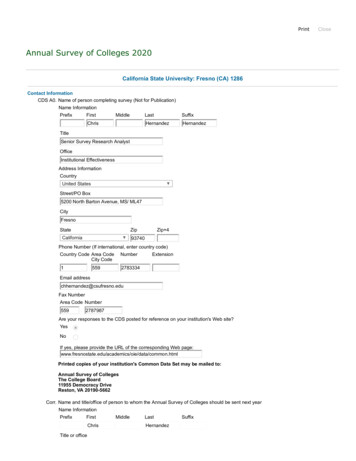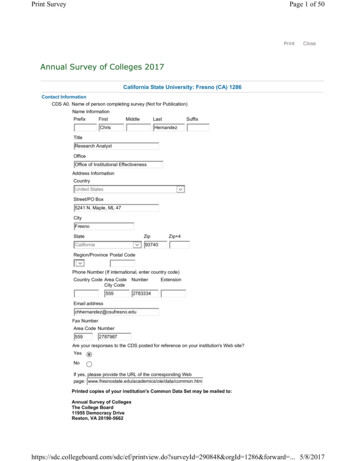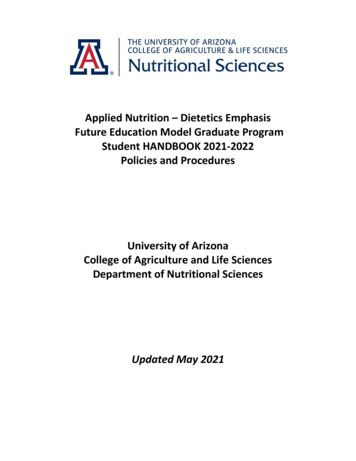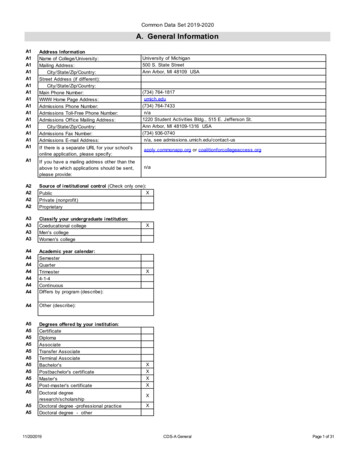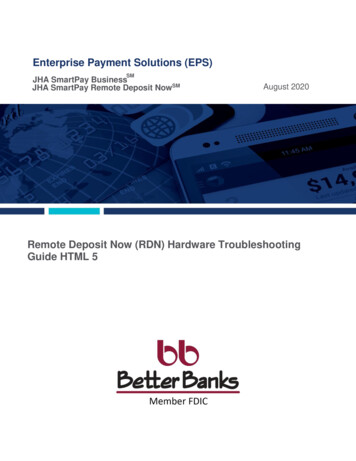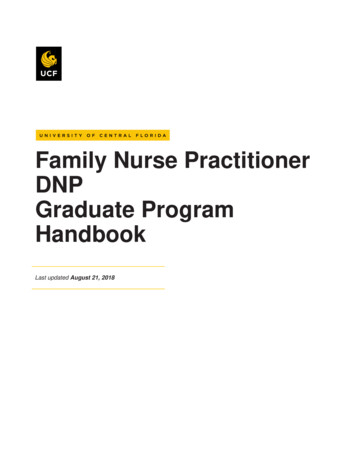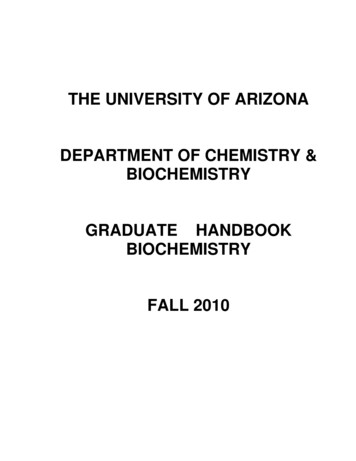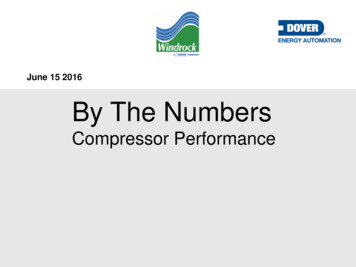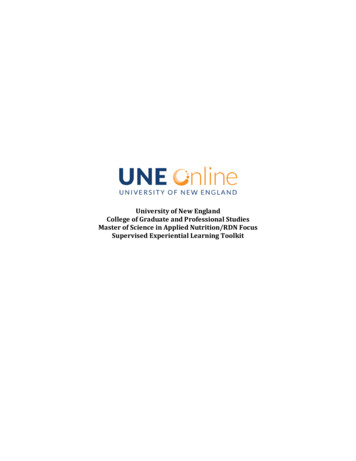
Transcription
University of New EnglandCollege of Graduate and Professional StudiesMaster of Science in Applied Nutrition/RDN FocusSupervised Experiential Learning Toolkit
Table of ContentsSection 1: General Overview of the Program .1Mission of the Program . 1MSAN/RDN Focus Learning Outcomes 1Admission Requirements .3Section 2: Process to Matriculation 3Application Process .4Post Matriculation Approval for Second Year SEL Hours. . 6Section 3 Appendices . .9Appendix A: Plan of Study document . 10Appendix B: Table 1 SEL Requirements for the program. .14Appendix C: Guidelines for Contacting Potential Preceptors . .15Appendix D: Letter to Potential Preceptors . .17Appendix E: Supervised Experiential Learning First Year Guidance Documents .20Appendix F: Supervised Experiential Learning Facility Form .29Appendix G: Preceptor Information and Commitment Form. 35Appendix H: Affiliation Agreement template .41Appendix I: Approval Form for First Year SEL Hours . 48
Section 1General Overview of the ProgramThe UNE MS Applied Nutrition (MSAN) RDN focus is designed to be completed in 2 years full-time(two 3-credit didactic courses paired with two 1-credit lab courses per semester inclusive ofsummers).The program will be 48 credit hours. College of Graduate and Professional Studies courses aredivided over a traditional 16-week semester; each semester has two 8-week terms with A termencompassing the first 8 weeks of the semester and B term encompassing the last 8 weeks. 16week courses, such as the Capstone and its co-requisite course are offered over the full semester, orAB term. Each 3-credit course and the 1-credit lab that it is paired with are offered in either A or Bterm. Supervised Experiential Learning (SEL) will be incorporated in every course, and theSupervised Experiential Learning hours each student will participate in will total to 1214 hours.The Supervised Experiential Learning hours will be incorporated in both the didactic course work(164 hours) as well as in the lab courses; the majority (1050 hours) of Supervised ExperientialLearning will be attained at the pre-approved precepted site(s) in each 1 credit lab. The lab creditwill consist of a combination of templates that will document Student Experiential Learning hours,assessments to determine if competencies have been achieved, and a mechanism for Faculty andPreceptor interface to assess student learning outcomes. The student is responsible for completingthe required Supervised Experiential Learning, and the preceptor will interface with the lab Facultyto confirm the attainment of competencies (high pass/pass/fail). The Faculty will assess additionalwork within the lab such as simulations, role playing, reflections, and attainment of second year SELhours to assign a high pass/pass/fail grade after consideration of the preceptor assessment ofstudent achievement and required coursework to demonstrate achievement of the SupervisedExperiential Learning competencies.Mission of the ProgramThe mission of the UNE Master of Science in Applied Nutrition program is to prepare individuals forleadership roles in the field of nutrition, to advance knowledge and expand skills that promoteexcellence and innovation in all areas of nutrition practice, and to emphasize evidence-based bestpractices to support the well-being and health outcomes of individuals, families, and communitiesthrough education, research, and scholarship. The Master of Science in Applied Nutrition RegisteredDietitian Nutritionist (RDN) focus provides a verification statement upon successful completion ofprogram requirements, which prepares graduates for practice as an RDN once they have passed theRDN exam.MSAN/RDN Focus Learning OutcomesGraduates of the Master of Science in Applied Nutrition Program will:1. Analyze and apply evidence-based nutrition research to nutrition practice2. Assess, evaluate and implement appropriate recommendations founded in medical nutritiontherapy3. Demonstrate ethical behavior and cultural competency in all areas of nutrition andinterprofessional practice4. Communicate evidence-based research in nutrition to a wide variety of audiences1
5. Apply best practices in digital communications and health informatics technologies to interfacewith patients, peers, administrators and care providersMSAN/RDN Focus Program GoalsGoal #1: Graduates of the Master of Science in Applied Nutrition Program will be competentpractitioners that are equipped to pass the RDN exam, that are ethical and skilled in-patientcare, and that are competitively employable in the field.Goal #2: Graduates of the Master of Science in Applied Nutrition Program will use evidencebased knowledge to inform best practices in nutrition professions and Medical NutritionTherapy.Program Objectives Supporting the MSAN/RDN Focus Program Goal #1: At least 80% of graduates who respond to the “Alumni Survey” will select “stronglyagree” or “agree” indicating they were adequately prepared to be an effective RDNpractitioner in their first post-graduate professional position. At least 80% of employers who respond to the “Employer Survey” will select “stronglyagree” or “agree” indicating the graduates demonstrated ethical behavior and culturalcompetency in all areas of nutrition and interprofessional practice in their first postgraduate professional position.Program Objectives Supporting the MSAN/RDN Focus Program Goal #2: At least 80% of graduates who respond to the “Alumni Survey” will select “stronglyagree” or “agree” indicating they were able to communicate evidence-based research innutrition to a wide variety of audiences in their first post-graduate professionalposition. At least 80% of employers who respond to the “Employer Survey” will select “stronglyagree” or “agree” indicating the graduates were able to communicate evidence-basedresearch in nutrition to a wide variety of audiences in their first post-graduateprofessional position.ACEND Specific Goals:1. Program Completion: At least 80% of program graduates complete program/degreerequirements within 3 years (150% of the program length).2. Graduate Employment: Of graduates who seek employment, 80 percent are employed innutrition and dietetics or related fields within 12 months of graduation.3. Employer Satisfaction: At least 80% of employers who respond to the “EmployerSurvey” will select “strongly agree” or “agree” indicating graduates were adequatelyprepared to be an effective RDN practitioner in their first post-graduate professionalposition.2
4. Registration Exam:a. 80% of program graduates take the CDR credentialing exam for dietitiannutritionists within 12 months of program completion.b. The program’s one-year pass rate (graduates who pass the registration examwithin one year of first attempt) on the CDR credentialing exam for dietitiannutritionists is at least 80%.Admission Requirements A bachelor’s degree or above from a regionally accredited institution or its equivalent.o See International Admissions for details regarding evaluation of internationaldegrees for grade and degree equivalencyo Students graduating soon can apply for conditional acceptance pending receipt offinal official transcriptUndergraduate cumulative GPA of 3.0 or better. Applicants with a GPA lower than 3.0will be considered for admission with statement of rationale for GPA and plans for futuresuccess.Verification Statement indicating completion of ACEND Accredited DPD program inthe United States rams/didacticprograms-in-dietetics) or earned B- or better in prerequisite course work (comparablecourses will be considered for transfer credit pursuant to the transfer credit policy)including*:o Applied Anatomy and Physiologyo Applied Nutritional Biochemistryo Applied Food InnovationPrevious coursework in Nutrition and/or Biology, and Statistics is highly recommended400 hours (equivalent to all SEL hours required for the first year of courses) of therequired 1050 hours total Supervised Experiential Learning Sites approved by theMSAN Assistant Director/Director of RDN Focus via the submitted “Approval Form for FirstYear SEL Hours”Computer with internet connection, including the hardware and software requirementsdescribed in our Technical Requirements. Must also possess sufficient computer skills tonavigate the internet as all classes are accessed 100% online.* If pre-requisite course work or the Verification Statement are older than 5 years, it isstrongly recommended that the applicants consider taking the 3 pre-requisite courses.Section 2Process to MatriculationStep 1: Contact UNE MSAN Enrollment Team ns)tomake sure you meet requirements for admission.Step 2: Fill out the application for admission (this should be completed no later than two weeksbefore anticipated date of matriculation).3
Step 2a: Create an account for the Online Application Portal, start a new application and fill outall required fields.o You will be asked to provide contact information for three references, preferably ofsupervisory or leadership positions.o You will be asked to compose statements in response to the following prompts inone to two paragraphs (250-350 words) for each prompt:1. Describe how your previous educational and/or professional experience(s)have prepared you for graduate studies, particularly in the field of nutrition?2. Describe your short and long-term professional goals as related to the field ofnutrition.3. What specific topics in nutrition motivate you to pursue graduate study in thisprogram?4. Why is an online program the right fit for you? In answering this question,please address time management, self-motivation, access to technology andcomputer literacy.Step 2b:Upload all supporting documents:o Professional Resume/CV: Must be current and include current professional rolesand responsibilitiesStep 2c: Request an official transcript reflecting conferral of bachelor’s degree or above. Applicantswith international degrees should contact an enrollment counselor for more information.Official transcripts must be submitted to UNE directly from the institution. Please contactyour college or university as soon as possible and request that they send an officialtranscript via mail to the address below or by certified electronic delivery. We will notifyyou as soon as we receive your official transcript.If your transcript is from an international institution, it will need to be translated and/orevaluated for U.S. grade and degree equivalency and sent to us directly from the evaluationcompany. Please contact an enrollment counselor for more information.If sent electronically, request that your transcript be sent to: nutrition@une.eduIf mailed, request that your transcript be addressed to:University of New EnglandCollege of Graduate & Professional StudiesAttention: Applied Nutrition716 Stevens AvenuePortland, ME 04103 Please Note: Additional transcripts may be required or requested. You can always submitadditional transcripts if you feel they would strengthen your application.Step 3: Once a student has received notification that they have been accepted pending SEL, theywill be given the information to set up an appointment with the MSAN Assistant Director/Directorof RDN Focus to discuss the process of setting up SEL sites and work on tentative plan of study foranticipated date of matriculation (Appendix A). It will be required that students will secure 400hours of Supervised Experiential Learning sites for the first year in the program prior to application.Please see Plan of Study document in Appendix A and Table 1 in Appendix B of the for acceptable sitesand required experiences, including total hours needed at each type of facility, to meet the minimum SEL4
requirements for the first year. The student will reach out to potential preceptors by following theGuidelines for Contacting Potential Preceptors (Appendix C of the “RDN Applicant Handbook”) andattaching the Letter to Potential Preceptor (Appendix D “RDN Applicant Handbook”) in the introductoryemail.Step 3a: Students will fill out Supervised Experiential Learning Facility Form using the SupervisedExperiential Learning Guidance Documents provide guidance on the types of SEL sites needed foreach lab course. The Supervised Experiential Learning First Year Guidance Documents (AppendixE) provide guidance on the types of SEL sites needed for each lab course and help the student tocomplete the required Supervised Experiential Learning Facility Form (Appendix F).The student will submit the required Supervised Experiential Learning Facility Forms (Appendix F)to the MSAN Assistant Director/Director of RDN Focus for the following courses: APN 602 Trends and Issues in Nutrition lab APN 606 Nutrition Across the Lifespan lab APN 611 Research Methods lab APN 616 Nutrient and Metabolism lab APN 621 Nutrition Education and Health Behavior Change lab APN 736 Nutrition Leadership, Community Nutrition and Wellness labPlease note, in all cases the student will be supported to the extent possible by the MSAN AssistantDirector/Director of RDN Focus to locate sites and negotiate successful affiliation agreements withthese sites, however it remains the student’s responsibility to locate appropriate sites.Step 3b. The preceptor will complete and submit the Preceptor Information and Commitment Formin Appendix G) and required affiliation agreements (Appendix H) to the MSAN AssistantDirector/Director of RDN Focus for approval. Preceptor Information and Commitment Form (the hyperlink to the form will beprovided by the MSAN Assistant Director/Director of RDN Focus once in receipt of theSupervised Experiential Learning Facility Forms) Affiliation AgreementsStep 4: Step 4: MSAN Assistant Director/Director of RDN Focus will approve the preceptors,facilities and document receipt of finalized affiliation agreements. Once approved, the student willreceive a signed Approval Form for First Year SEL Hours (Appendix I) from MSAN AssistantDirector/Director of RDN Focus. Students will be contacted by Enrollment regarding programmatriculation and course registration.Step 5: Once the signed Approval Form for First Year SEL Hours is received, it is the student’sresponsibility to confirm with the preceptors the dates and type of SEL previously agreed upon.5
Student Responsibilities Introductory email to potential preceptors including the following forms:o Formal letter to Potential Preceptoro Preceptor Information and Commitment Formo Affiliation agreement template Complete and submit Supervised Experiential Learning Facility Form to MSAN AssistantDirector/Director of RDN FocusPreceptor Responsibilities Complete and submit the Preceptor Information and Commitment Form to the MSAN AssistantDirector/Director of RDN Focus Complete and submit the completed Affiliation Agreements to the MSAN AssistantDirector/Director of RDN FocusProgram Responsibilities Support and guide students as they search for and secure SEL sites Approve the preceptors, facilities and document receipt of finalized affiliation agreementsPost Matriculation Approval for Second Year SEL HoursStep 1: Once matriculated into the program, the student will be required to secure the remaining540 hours of SEL for year two of the program. 180 hours of SEL will need to be submitted forapproval by MSAN Assistant Director/Director of RDN Focus as a lab course requirement for APN606, APN 616, and APN 736, respectively. The Supervised Experiential Learning GuidanceDocuments for the second year SEL (similar to those in Appendix E) and the SupervisedExperiential Learning Facility Forms for required second year SEL (similar to those in Appendix F)will be provided in the lab course.6
Step 2: The student will need to submit the following forms as outlined below via a courseassignment in the designated lab courses. The MSAN Assistant Director/Director of RDN Focus willreview the assignments for approval of the proposed second year SEL preceptors, facilities andrequired affiliation agreements. Once approved, the student will receive a signed Approval Form forSecond Year SEL Hours (similar to that in Appendix I) from MSAN Assistant Director/Director ofRDN Focus.Step 2a: Complete Supervised Experiential Learning Facility Form for the following coursesAPN 731 Medical Nutrition Therapy labAPN 761 Micronutrients: Nutrition and Functional Applications lab 180 hours submitted to MSAN Assistant Director/Director of RDN Focus forapproval by first semester term B of the first year (APN 606) for APN 731 and761Step 2b: Complete Supervised Experiential Learning Facility Form for the following courses:APN 781 Food and Nutrition Operations Management labAPN 786 Nutrition Assessment and Application in a Clinical Setting lab 180 hours submitted to MSAN Assistant Director/Director of RDN Focus forapproval by second semester term B of the first year (APN 616) for APN 781 and786Step 2c: Complete Supervised Experiential Learning Facility Form for the following courses:APN 776 Advanced Nutrition Research labAPN 756 Applied Nutrition Capstone lab 180 hours submitted to MSAN Assistant Director/Director of RDN Focus forapproval by third semester term B of the first year (APN 736) for APN 776 and756.Step 2d: The preceptor will complete and submit to the MSAN Assistant Director/Director of RDNFocus: Preceptor Information and Commitment Form (the hyperlink to the form will beprovided by the MSAN Assistant Director/Director of RDN Focus once in receipt of theSupervised Experiential Learning Facility Forms) Affiliation AgreementsIn all cases the student will be supported to the extent possible by the MSAN AssistantDirector/Director of RDN Focus to identify potential SEL sites and negotiate successfulaffiliation agreements with these sites, however it remains the student’s responsibility tolocate appropriate sites. In the event that the student is not able to find suitable sites, thefollowing procedures will be adhered to.Should a student have a challenge arranging the remaining sites as required in the labcourses (see Plan of Study document in Appendix A) and Table 1 in Appendix B) thestudent must immediately contact the MSAN Assistant Director/Director of RDN Focus and,if applicable, the Faculty of their current lab course. The student and MSAN AssistantDirector/Director of RDN Focus will determine if previous/current sites can meet theneeds and remaining Supervised Experiential Learning (SEL) hours and competencies. If7
this is not possible, the MSAN Assistant Director/Director of RDN Focus and student willdiscuss and determine the appropriate course of action for the student which could includebut is not limited to: the MSAN Assistant Director/Director of RDN Focus will help the student reviewother potential sites in their geographical area that they might be able to contact forpossible SEL hoursthe student and the MSAN Assistant Director/Director of RDN Focus can discuss withpotential preceptor(s) in the area if off-schedule SEL hours would be an option, forinstance completing 20 hours in one weekif additional sites are not available, the MSAN Assistant Director/Director of RDNFocus will develop a plan to help the student meet the remaining SEL requirementsand competencies assessed at the siteo these hours and competencies would be met through a combination ofalternate learning experiences, not to total to more than 136 hours for theremainder of the program, and actual SEL hours as required to attaincompetencythe student will sign an agreement to complete the alternate and actual SEL plansand the MSAN Assistant Director/Director of RDN Focus will note the plan on the“Alternative Learning Experience Plan of Study” form. If a student is changing theirplanned SEL to include different actual experiences they need to fill out an amended“Supervised Experiential Learning Facility” formthe MSAN Assistant Director/Director of RDN Focus will notify Student Support andlab Faculty of the revised plan of studythe lab Faculty (always an RD with preceptor experience, in the event of suchinstances) will utilize the appropriate competency assessment forms to determine ifthe student has successfully demonstrated competence through the alternateexperiencesif the Supervised Experiential Learning competencies are not met and the studentcannot achieve a low-pass grade in the associated course, the student will be able toretake the lab portion of the courseall students are subject to the General Satisfactory Academic Progress Policy (seepage 11 in the “MSAN RDN Focus Student Handbook”)Students may need to consider dividing clinical hours between a few different facilities oroffer to complete SEL hours on the weekends if the site can accommodate them. TheAssistant MSAN Director/Director of RDN Focus will help as much as possible, but thestudent is responsible for finding a new SEL site and preceptor in a geographic locationsuitable to the student.8
Section 3: AppendicesAppendix A: Plan of Study Sample and Form(subject to change based on dates of matriculation and satisfactory academic process and attainment of requisite SEL hours)Narrative: To be completed in the pre-application process.Includes:Sample plan of studyBlank plan of studyPre-requisite requirements for admission to the RDN Focus: A bachelor’s degree or above from a regionally accredited institution or its equivalent. See International Admissions for details regarding evaluation ofinternational degrees for grade and degree equivalencyUndergraduate cumulative GPA of 3.0 or betterPrevious coursework in Nutrition and/or Biology, and Statistics is highly recommendedComputer with internet connection, including the hardware and software requirements described in our Technical Requirements. Must also possess sufficientcomputer skills to navigate the internet as all classes are accessed 100% online.Completed and Approved SEL hours for first year (400 hours)Required pre-requisite coursework:APN 505 Applied A and P, APN 510, Applied Nutritional Biochem, APN 515 Applied Food InnovationThese may be transfer equivalencies, OR a Verification Statement indicating completion of ACEND Accredited DPD program in the United d-programs/didactic-programs-in-dietetics )o If pre-requisite course work OR the Verification Statement are older than 5 years, it is strongly recommended that the applicants consider taking the 3pre-requisite courses9
MS Applied Nutrition, RDN focus 2-year Full-time student plan of study exampleSample Plan of Study to guide selection of SEL for FT Student seeking admission, Spring 2021Year 1 Spring 2021Year 1 Sumer 2021Year 1 Fall 2021Didactic CoursesDates*SEL typeSpring ASpring BSummer ASummer BFall AFall BAPN 601 (3cr.) Trendsand Issues inNutritionAPN 605 (3 cr.)Nutrition Acrossthe LifespanAPN 610 (3cr.) ResearchMethodsAPN 615 (3 cr.)Nutrition andMetabolismAPN 620 (3 cr.)NutritionEducation &Health BehavChgAPN 735 (3 cr.) NutritionLeadership, CommunityNutrition and WellnessAPN 621 (1 cr.)NutritionEducation andHealth BehaviorChange labAPN 736 (1 cr.) NutritionLeadership, CommunityNutrition and Wellness lab8/30-10/810/25-12/39090APN 602 (1cr.) Trendsand Issues inNutrition labLab courses and required SELAPN 606 (1 cr.)APN 611 (1APN 616 (1 cr.)Nutrition Across cr.) Research Nutrition andthe Lifespan labMethods lab quired 03030Total510 hours*Students participate in SEL hours during weeks 2-7 of each 8-week lab course. The dates provided are not course start/end, but the weeks SEL will needto be logged during. For APN 602 this is equivalent to 10 hours a week of SEL. In APN 606, 611, 616, 621, and 736, this is equivalent to 15 hours a week.In extenuating circumstances and with prior permission of the Faculty and MSAN Assistant Director/Director RDN Focus, different options within thecourse may be approved based on Preceptor need/availability (ie, APN 602: 20 hr. wk. 2, 0 hr. wk. 3, 10 hr. wk. 4-7).10
MS Applied Nutrition, RDN focus 2-year Full-time student plan of study exampleSample Plan of Study to guide selection of SEL for FT Student admitted, Spring 2021(expected Fall 2022 completion)Year 2 Spring 2022Year 2 Sumer 2022Year 2 Fall 2022Didactic CoursesDates*SEL typeClinicalSpring ASpring BSummer ASummer BFall ABAPN 730 (3cr.) MedicalNutritionTherapyAPN 760 (3 cr.)Micronutrients:Nutrition andFunctionalApplicationsAPN 780 (3 cr.)Food andNutrition OpMgmtAPN 785 (3 cr.)Nutrition Assessment &App in a Clin SetAPN 775* RDN focus co-req and APN755* RDN focus capstone (3 cr. Each)APN 731 (1cr.) MedicalNutritionTherapy labAPN 761 (1 cr.)Micronutrients:Nutrition andFunctionalApplications lab1/10-2/183/7-4/15Lab courses and required SELAPN 781 (1 cr.)APN 786 (1 cr.)Food andNutr Assessment & AppNutrition Opin a Clin Set labMgmt labAPN 776 RDN focus co-req lab and APN756 RDN focus capstone lab (1 cr. Each)5/2-6/108/29-12/26/27-8/5Required hoursAPN 776APN 75630303030903030180 hours for APN 731/761 mustbe approved by the end of firstsemester term B of the first year180 hours for APN 781/786 must be approvedby the end of second semester term B of thefirst year180 hours for APN 776/756 must beapproved by the end third semester term Bof the first yearDue: 4/25/2021Due: 8/15/2021Due: 12/12/20219090CommunityFoodServiceMgmtTotalDate SELmust beconfirmedProgram permission required90540 hours11
MS Applied Nutrition, RDN focus 2-year Full-time student plan of studyPlan of Study to guide selection of SEL for FT Student seeking admission, Semester YearYear 1Semester YearYear 1Year 1Semester Year Semester YearDidactic CoursesSpring ASpring BSummer ASummer BFall AFall BAPN 601 (3cr.) Trendsand Issues inNutritionAPN 605 (3 cr.)Nutrition Acrossthe LifespanAPN 610 (3 cr.)ResearchMethodsAPN 615 (3 cr.)Nutrition andMetabolismAPN 620 (3 cr.)NutritionEducation &Health BehavChgAPN 735 (3 cr.) NutritionLeadership, CommunityNutrition and WellnessAPN 606 (1 cr.)Nutrition Acrossthe Lifespan labLab courses and required SELAPN 611 (1 cr.)APN 616 (1 cr.)ResearchNutrition andMethods labMetabolism labAPN 621 (1 cr.)NutritionEducation andHealth BehaviorChange labAPN 736 (1 cr.) NutritionLeadership, CommunityNutrition and Wellness lab9090APN 602 (1cr.) Trendsand Issues inNutrition labDates*SEL typeRequired 03030Total90510 hours*Students participate in SEL hours during weeks 2-7 of each 8-week lab course. The dates provided are not course start/end, but the weeks SEL will needto be logged during. For APN 602 this is equivalent to 10 hours a week of SEL. In APN 606, 611, 616, 621, and 736, this is equivalent to 15 hours a week.In extenuating circumstances and with prior permission of the Faculty and MSAN Assistant Director/Director RDN Focus, different options within thecourse may be approved based on Preceptor need/availability (ie, APN 602: 20 hr. wk. 2, 0 hr. wk. 3, 10 hr. wk. 4-7).12
MS Applied Nutrition, RDN focus 2-year Full-time student plan of study exampleSample Plan of Study to Guide selection of SEL for FT Student Admitted, Spring 2021(expected Fall 2022 completion)Year 2Semester YearYear 2Semester YearYear 2Semester YearDidactic CoursesSpring ASpring BSummer ASummer BFall ABAPN 730 (3cr.) MedicalNutritionTherapyAPN 760 (3 cr.)Micronutrients:Nutrition andFunctionalApplicationsAPN 780 (3 cr.)Food andNutrition OpMgmtAPN 785 (3 cr.)Nutrition Assessment &App in a Clin SetAPN 775* RDN focus co-req and APN755* RDN focus capstone (3 cr. Each)APN 731 (1cr.) MedicalNutritionTherapy labAPN 761 (1 cr.)Micronutrients:Nutrition andFunctionalApplications labLab courses and required SELAPN 781 (1 cr.)APN 786 (1 cr.)Food andNutr Assessment & AppNutrition Opin a Clin Set labMgmt labProgram permission requiredAPN 776 RDN focus co-req lab and APN756 RDN focus capstone lab (1 cr. Each)Dates*SEL typeClinicalRequired hoursAPN 776APN 75630303030903030180 hours for APN 731/761 mustbe approved by the end of firstsemester term B of the first year180 hours for APN 781/786 must be approvedby the end of second semester term B of thefirst year180 hours for APN 776/756 must beapproved by the end third semester term Bof the first ate SELmust beconfirmed90540 hours13
Appendix B: Table 1 SEL Requirements for the programTable 1: Key: Green courses didactic courses, Blue courses lab courses, Orange required for admissionTermCourseFirst year, first semester term AAPN 601APN 602APN 605APN 606First year, first semester term B*180 hours for APN 731/761must be submitted for approvalby the end of first semesterterm B of the first yearFirst year, second semesterterm AFirst year, second semesterterm B**180 hours for APN 781/786must be submitted for approvalby the end of second semesterterm B of the first yearFirst year, third semester termAFirst year, third semester termB***180 hours for APN 776/756must be submitted for approvalby the end third semester termB of the first yearTotal hoursSecond year, first semesterterm ASecond year, first semesterterm BClinicalSELCommunitySELFood ServiceManagementSEL202020303030APN 610Second year, second semesterterm BAPN 611APN 61530APN 6169030For admission15For admission15APN 621APN 73590APN 73690For admission15For admission400APN 730APN 731APN 7602090390APN 780*180 hours must be submitted forapproval by first semester term B of thefirst year (APN
The UNE MS Applied Nutrition (MSAN) RDN focus is designed to be completed in 2 years full-time (two 3-credit didactic courses paired with two 1-credit lab courses per semester inclusive of summers). The program will be 48 credit hours. College of Graduate and Professional Studies courses are
